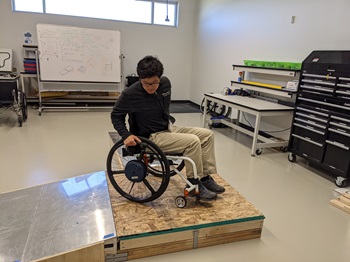Assistive Technology for Mobility (ATM)
Lab Mission
As part of the Center for Inclusive Design and Engineering (CIDE)
infrastructure, we share CIDE's overarching mission to accelerate applied
transdisciplinary technology research and innovation for persons with
disabilities and the elderly in collaboration with a wide spectrum of global
enterprise, government, researchers, developers and social stakeholders.
The Assistive Technology for Mobility (ATM) Lab contributes to this mission
by developing tools and methods that empower clinicians, manufacturers,
and individuals with disabilities to make scientifically-motivated and
contextually-sound decisions during the prescription, design, and selection
of assistive technology for mobility.
Collaborations and Tools
The Assistive Technology for Mobility (ATM) Lab utilizes the diverse resources offered by the Center for Inclusive Design and Engineering (CIDE), particularly prototyping equipment, clinician and patient access, and expansive lab spaces for testing assistive technology for mobility. Specifically, we leverage sensing and data acquisition technology to develop clinical measurement tools, as well as design empirical methods and testbeds to quantify assistive technology performance. The ATM Lab collaborates frequently with other CIDE labs, and has local collaborations within the Department of Bioengineering. For example, we interface with CIDE's Inclusive Design Lab to evaluate the practicality and utility of our developed tools and methods in clinical environments via usability testing and other human factor methods, increasing their opportunity for real-world adoption.
Work We Do
Our current projects operate with the shared goal of characterizing and
optimizing wheelchair technology for individuals with disabilities. These
include the development and implementation of a sensor platform for
tracking manual wheelchair mobility patterns, as well as a clinical
measurement tool for quantifying wheelchair seating and positioning
parameters.
For more information, see CIDE Research.